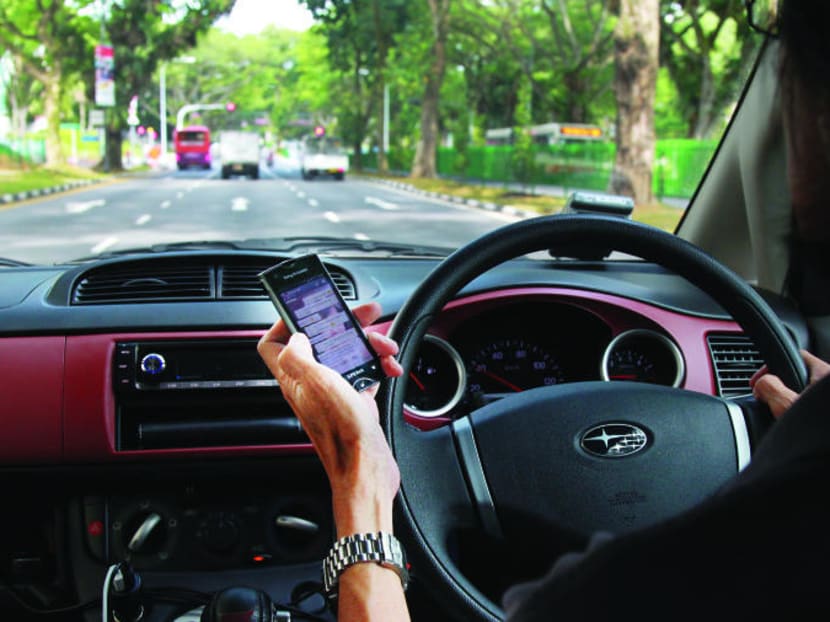Amended traffic laws not tough enough, say MPs
SINGAPORE — From February, holding and using any mobile communication device — including tablets — while driving could be punishable with fines and imprisonment, under new laws passed yesterday, even though some Members of Parliament (MPs) felt the rules did not go far enough to combat a growing road menace.
SINGAPORE — From February, holding and using any mobile communication device — including tablets — while driving could be punishable with fines and imprisonment, under new laws passed yesterday, even though some Members of Parliament (MPs) felt the rules did not go far enough to combat a growing road menace.
All eight MPs who rose to speak in the House felt the changes were a step in the right direction, but thought the laws could be stricter.
Some noted that devices mounted on dashboards, non-communication devices such as the Nintendo DS and wearable technology such as Google Glass fall outside the law’s ambit. These devices, they said, pose dangerous distractions for motorists.
Others felt it should be an offence to hold and use these devices even when the vehicle is not in motion, as motorists would otherwise be able to use them when they stop at a traffic light or in a traffic jam.
“The restriction should apply to the entire driving process. Drivers should remain alert to road conditions and any other road users until the car is safely parked,” said Bishan-Toa Payoh GRC MP Hri Kumar, adding that this was the case in other countries such as the United Kingdom.
Currently, it is an offence for a driver to hold and use a mobile phone and communicate with it while the vehicle is in motion. Under changes passed to the Road Traffic Act, this will now apply to any mobile communication device and the definition of “use” has been expanded to include surfing the Internet, checking emails and playing games.
If found guilty, a motorist can be fined S$200 and given 12 demerit points. If charged in court, first-time offenders can be fined up to S$1,000 and jailed up to six months. The penalties will be doubled for repeat offenders. The number of summonses issued to motorists using their mobile phones while driving has risen over the years, from 2,817 in 2011 to 3,572 last year. In the first six months of the year, 1,761 summonses were issued.
Responding to MPs’ concerns, Senior Minister of State (Home Affairs and Foreign Affairs) Masagos Zulkifli said the authorities had “deliberately decided to take a measured approach in tightening the rules on handphone driving”.
“It is neither possible nor practical for the law to specify all the actions and devices that could potentially distract a driver,” said Mr Masagos, adding that Singapore’s approach is consistent with that of jurisdictions such as Hong Kong.
“We will continue to monitor the situation after the new changes come into effect and study practices of other jurisdictions, as they evolve to deal with other types of smart devices that are being developed.”
Other amendments passed include the rebuttable presumption regime for selected traffic offences such as speeding. Vehicle owners would now be presumed to have committed the offence if they fail to provide the Traffic Police with particulars of the driver who committed it. However, they can rebut the presumption if they prove they were not the drivers at the time of the offence.
Motorists who are involved in accidents that have caused damage or injury also have the duty to provide their particulars to the owner of the vehicle or property, even when no one is around to ask for the information. For example, if a motorist hits a car in a car park, he should leave a note on the damaged car with his particulars.
And unless first contacted by the owner, all motorists must report the accident to the police in 24 hours. Those who fail to do so will be liable for the offence of hit-and-run.
To enhance drivers’ competency, work pass holders who drive for work purposes will need to obtain a local driving licence within six months of obtaining work passes from January 2016. Currently, they need to do so within 12 months from their last entry to the island.
However, Non-Constituency MP Gerald Giam felt the new window period was still too long. “Six months is a long time for someone who does not have a valid Singapore driving licence to be driving on our streets ... a foreign driver who is new to Singapore will tend to be unfamiliar with our roads.”
Another change would be raised licence conversion requirements for Work Permit and S-Pass holders who drive Class 3 vehicles, such as light goods vehicles and small buses. New applicants will now need to pass the Practical Driving Test and Basic Theory Test to convert to a Class 3 licence.
A voluntary Safe Driving Course will also be implemented to retrain motorists who have accumulated 12 or more demerit points. Individuals — excluding probationary drivers who have just obtained their driving licences — will have three demerit points deducted from their record on completion of the course.







